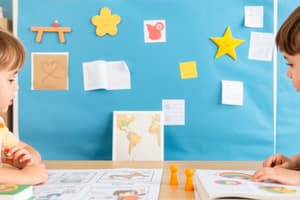Podcast
Questions and Answers
What is the primary focus of a child-centered approach in curriculum planning?
What is the primary focus of a child-centered approach in curriculum planning?
The needs, interests, and abilities of the child
What is the main purpose of assessment and evaluation in the curriculum planning process?
What is the main purpose of assessment and evaluation in the curriculum planning process?
To inform instruction and make adjustments to the curriculum
What type of learning is recognized as a valuable learning experience in early childhood education?
What type of learning is recognized as a valuable learning experience in early childhood education?
Play-based learning
What is the role of families and communities in the curriculum planning process?
What is the role of families and communities in the curriculum planning process?
What determines the content of a thematic curriculum?
What determines the content of a thematic curriculum?
What is the primary goal of identifying learning objectives in curriculum planning?
What is the primary goal of identifying learning objectives in curriculum planning?
What is the main benefit of using an emergent curriculum?
What is the main benefit of using an emergent curriculum?
What is essential to consider when creating a learning environment for young children?
What is essential to consider when creating a learning environment for young children?
Flashcards are hidden until you start studying
Study Notes
Principles of Curriculum Planning for Young Children
- Child-centered approach: Focus on the needs, interests, and abilities of the child
- Play-based learning: Recognize play as a valuable learning experience
- Inclusive and culturally responsive: Respect and value diversity in all its forms
- Family and community involvement: Encourage partnerships with families and communities
Curriculum Components
- Learning objectives: Clearly defined, measurable, and achievable goals
- Content: Knowledge, skills, and attitudes to be acquired
- Learning experiences: Activities and opportunities designed to achieve learning objectives
- Assessment and evaluation: Ongoing observation and assessment to inform instruction
Curriculum Planning Process
- Identify learning objectives: Determine what children should know and be able to do
- Develop learning experiences: Create activities and opportunities to achieve learning objectives
- Implement and facilitate: Provide support and guidance as children engage in learning experiences
- Assess and evaluate: Continuously monitor and assess child progress
- Reflect and revise: Use assessment data to inform instruction and make adjustments to the curriculum
Considerations for Young Children
- Developmentally appropriate: Recognize and respect the unique developmental stages of young children
- Individual differences: Account for varying abilities, interests, and learning styles
- Learning environments: Create a safe, engaging, and inclusive physical and emotional environment
Curriculum Planning Models
- Project-based learning: In-depth exploration of a topic or theme
- Emergent curriculum: flexible and responsive to children's interests and needs
- Thematic curriculum: Organized around a central theme or topic
- Integrated curriculum: Interconnected learning experiences across multiple subjects
Principles of Curriculum Planning for Young Children
- Focus on the needs, interests, and abilities of the child with a child-centered approach
- Recognize play as a valuable learning experience with play-based learning
- Respect and value diversity in all its forms with an inclusive and culturally responsive approach
- Encourage partnerships with families and communities with family and community involvement
Curriculum Components
- Clearly defined, measurable, and achievable goals with learning objectives
- Knowledge, skills, and attitudes to be acquired are the content of the curriculum
- Activities and opportunities designed to achieve learning objectives are learning experiences
- Ongoing observation and assessment to inform instruction are assessment and evaluation
Curriculum Planning Process
- Determine what children should know and be able to do by identifying learning objectives
- Create activities and opportunities to achieve learning objectives with developing learning experiences
- Provide support and guidance as children engage in learning experiences by implementing and facilitating
- Continuously monitor and assess child progress with assessing and evaluating
- Use assessment data to inform instruction and make adjustments to the curriculum by reflecting and revising
Considerations for Young Children
- Recognize and respect the unique developmental stages of young children with developmentally appropriate practices
- Account for varying abilities, interests, and learning styles with individual differences
- Create a safe, engaging, and inclusive physical and emotional environment with learning environments
Curriculum Planning Models
- In-depth exploration of a topic or theme with project-based learning
- Flexible and responsive to children's interests and needs with emergent curriculum
- Organized around a central theme or topic with thematic curriculum
- Interconnected learning experiences across multiple subjects with integrated curriculum
Studying That Suits You
Use AI to generate personalized quizzes and flashcards to suit your learning preferences.




